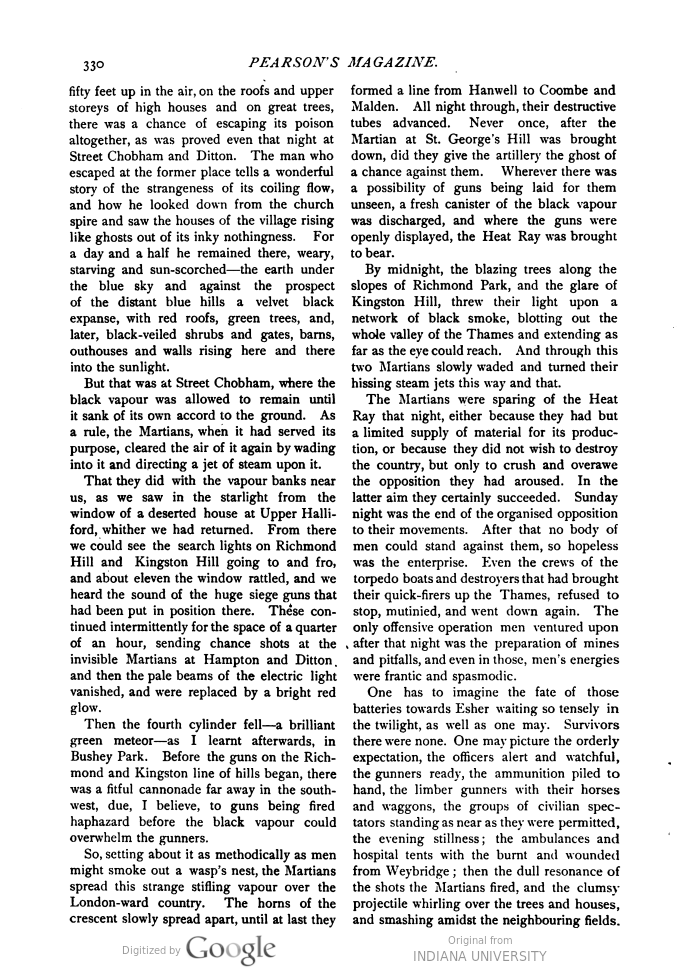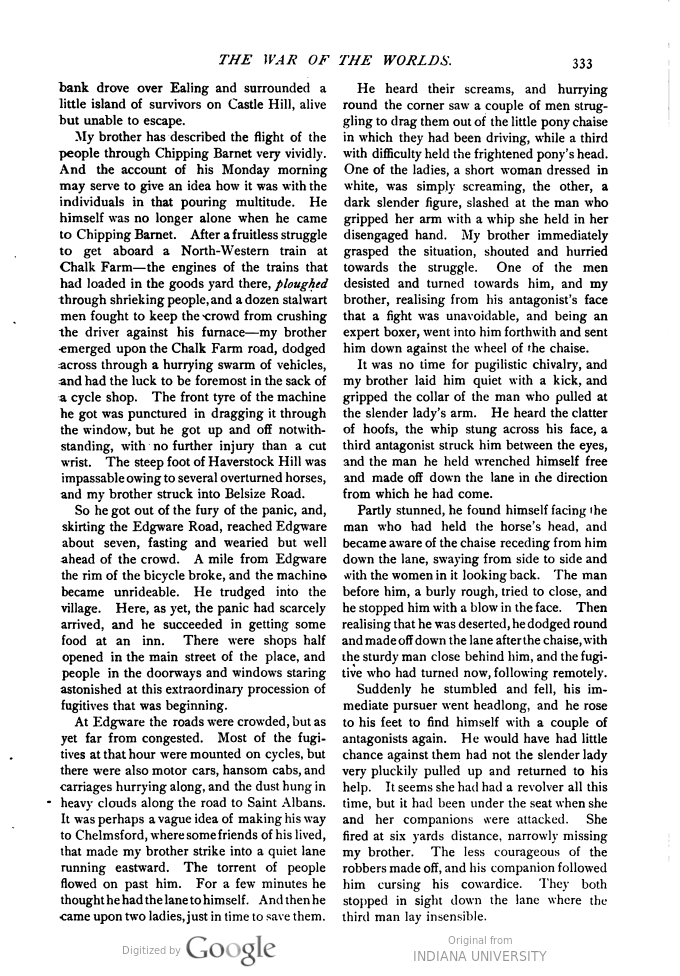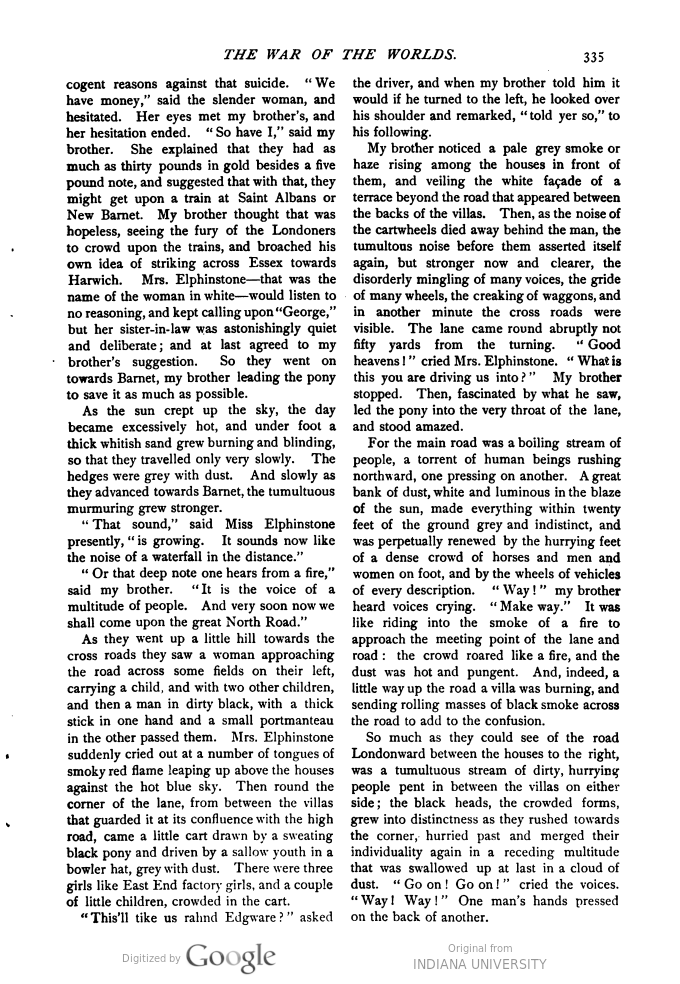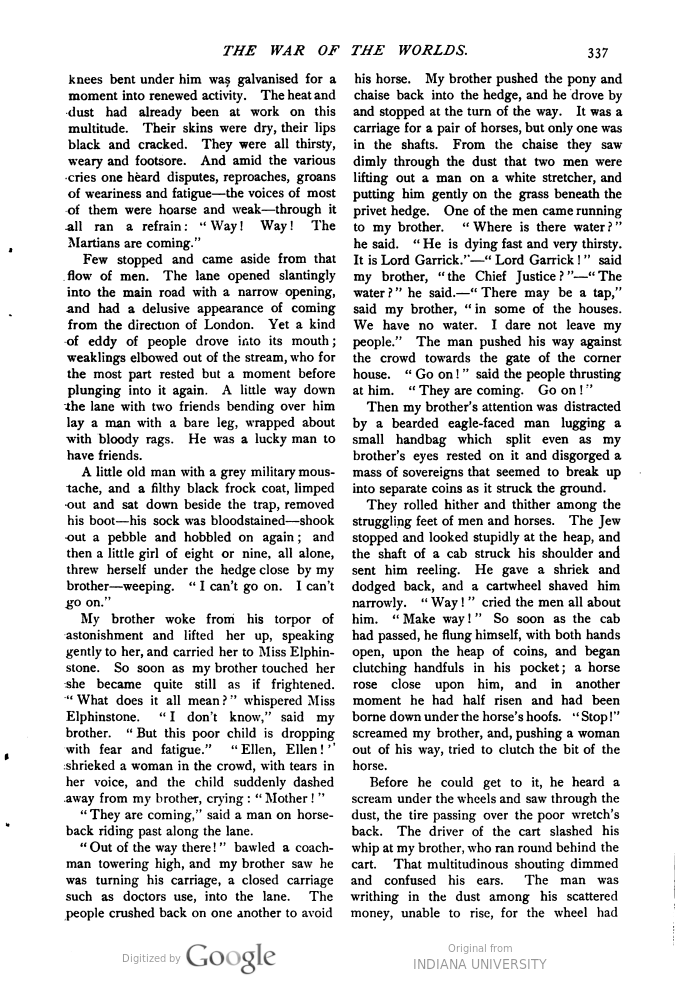Note: This page has been annotated with critical, historical, and cultural notes using the web annotation tool Hypothesis. You may view these annotations in the sidebar on the right-hand side of this page. Use the arrow icon to minimize the sidebar. A text-to-speech compatible transcript of the annotations for this page is available here.
The War of the Worlds in Pearson’s Magazine
Installment 6 of 9 (September 1897)
Pages from Pearson’s Magazine courtesy of HathiTrust, digitized by Google from originals at Indiana University.
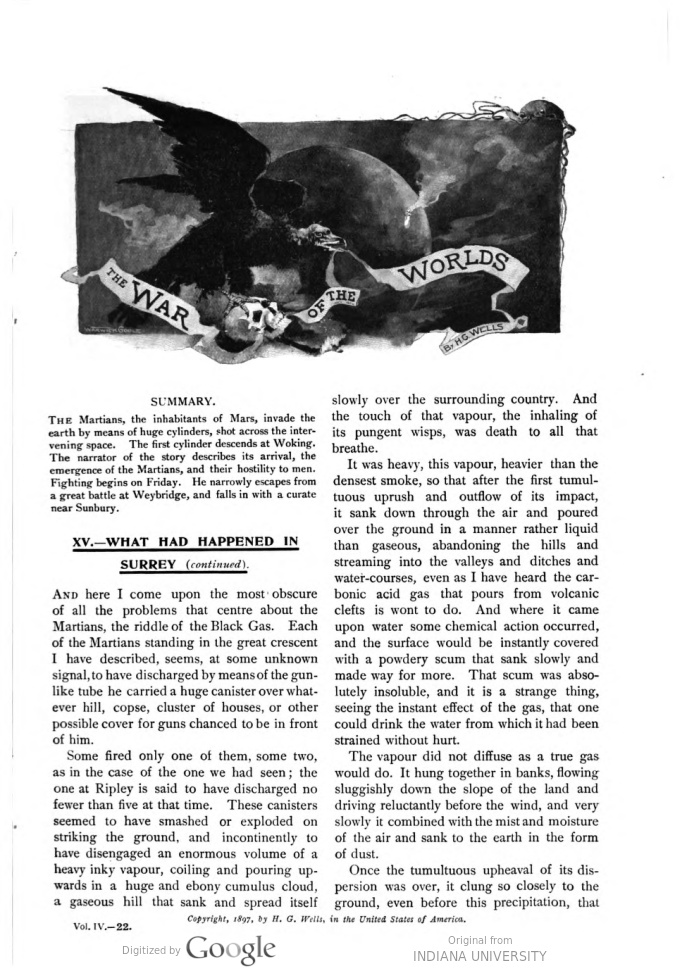
[text marker: start page 329]
THE WAR OF THE WORLDS
BY H. G. WELLS
SUMMARY.
The Martians, the inhabitants of Mars, invade the earth by means of huge cylinders, shot across the intervening space. The first cylinder descends at Woking. The narrator of the story describes its arrival, the emergence of the Martians, and their hostility to men. Fighting begins on Friday. He narrowly escapes from a great battle at Weybridge, and falls in with a curate near Sunbury.
XV. WHAT HAPPENED IN SURREY (continued).
And here I come upon the most obscure of all the problems that centre about the Martians, the riddle of the Black Gas. Each of the Martians standing in the great crescent I have described, seems, at some unknown signal, to have discharged by means of the gunlike tube he carried a huge canister over whatever hill, copse, cluster of houses, or other possible cover for guns chanced to be in front of him.
Some fired only one of them, some two, as in the case of the one we had seen; the one at Ripley is said to have discharged no fewer than five at that time. These canisters seemed to have smashed or exploded on striking the ground, and incontinently to have disengaged an enormous volume of heavy inky vapour, coiling and pouring upwards in a huge and ebony cumulus cloud, a gaseous hill that sank and spread itself slowly over the surrounding country. And the touch of that vapour, the inhaling of its pungent wisps, was death to all that breathe.
It was heavy, this vapour, heavier than the densest smoke, so that after the first tumultuous uprush and outflow of its impact, it sank down through the air and poured over the ground in a manner rather liquid than gaseous, abandoning the hills and streaming into the valleys and ditches and water-courses, even as I have heard the carbonic acid gas that pours from volcanic clefts is wont to do. And where it came upon water some chemical action occurred, and the surface would be instantly covered with a powdery scum that sank slowly and made way for more. The scum was absolutely insoluble, and it is a strange thing, seeing the instant effect of the gas, that one could drink the water from which it had been strained without hurt.
The vapour did not diffuse as a true gas would do. It hung together in banks, flowing sluggishly down the slope of the land and driving reluctantly before the wind, and very slowly it combined with the mist and moisture of the air and sank to the earth in the form of dust.
Once the tumultuous upheaval of its dispersion was over, it clung so closely to the ground, even before its precipitation, that [text marker: end page 329]
[text marker: start page 330] fifty feet up in the air, on the roofs and upper storeys of high houses and on great trees, there was a chance of escaping its poison altogether, as was proved even that night at Street Chobham and Ditton. The man who escaped at the former place tells a wonderful story of the strangeness of its coiling flow, and how he looked down from the church spire and saw the houses of the village rising like ghosts out of its inky nothingness. For a day and a half he remained there, weary, starving and sun-scorched—the earth under the blue sky and against the prospect of the distant hills a velvet black expanse, with red roofs, green trees, and, later, black-veiled shrubs and gates, barns, outhouses, and walls rising here and there into the sunlight.
But that was at Street Chobham, where the black vapour was allowed to remain until it sank of its own accord to the ground. As a rule, the Martians, when it had served its purpose, cleared the air of it again by wading into it and directing a jet of steam upon it.
This they did with the vapour banks near us, as we saw in the starlight from the window of a deserted house at Upper Halliford, whither we had returned. From there we could see the search lights on Richmond Hill and Kingston Hill going to and fro, and about eleven the window rattled, and we heard the sound of the huge siege guns that had been put in position there. These continued intermittently for the space of a quarter of an hour, sending chance shots at the invisible Martians at Hampton and Ditton, and then the pale beams of the electric light vanished, and were replaced by a bright red glow.
Then the fourth cylinder fell—a brilliant green meteor—as I learnt afterwards, in Bushey Park. Before the guns on the Richmond and Kingston line of hills began, there was a fitful cannonade far away in the southwest, due, I believe, to guns being fired haphazard before the black vapour could overwhelm the gunners.
So, setting about it as methodically as men might smoke out a wasp’s nest, the Martians spread this strange stifling vapour over the London-ward country. The horns of the crescent slowly spread apart, until at last they formed a line from Hanwell to Coombe and Malden. All night through, their destructive tubes advanced. Never once, after the Martian at St. George’s Hill was brought down, did they give the artillery the ghost of a chance against them. Wherever there was a possibility of guns being laid for them unseen, a fresh canister of the black vapour was discharged, and where the guns were openly displayed, the Heat Ray was brought to bear.
By midnight, the blazing trees along the slopes of Richmond Park, and the glare of Kingston Hill, threw their light upon a network of black smoke, blotting out the whole valley of the Thames and extending as far as the eye could reach. And through this two Martians slowly waded and turned their hissing steam jets this way and that.
The Martians were sparing of the Heat Ray that night, either because they had but a limited supply of material for its production, or because they did not wish to destroy the country, but only to crush and overawe the opposition they had aroused. In the latter aim they certainly succeeded. Sunday night was the end of the organised opposition to their movements. After that no body of men could stand against them, so hopeless was the enterprise. Even the crews of the torpedo boats and destroyers that had brought their quick-firers up the Thames, refused to stop, mutinied, and went down again. The only offensive operation men ventured upon after that night was the preparation of mines and pitfalls, and even in those, men’s energies were frantic and spasmodic.
One has to imagine the fate of those batteries towards Esher waiting so tensely in the twilight, as well as one may. Survivors there were none. One may picture the orderly expectation, the officers alert and watchful, the gunners ready, the ammunition piled to hand, the limber gunners with their horses and waggons, the groups of civilian spectators standing as near as they were permitted, the evening stillness; the ambulances and hospital tents with the burnt and wounded from Weybridge; then the dull resonance of the shots the Martians fired, and the clumsy projectile whirling over the trees and houses and smashing amidst the neighbouring fields. [text marker: end page 330]
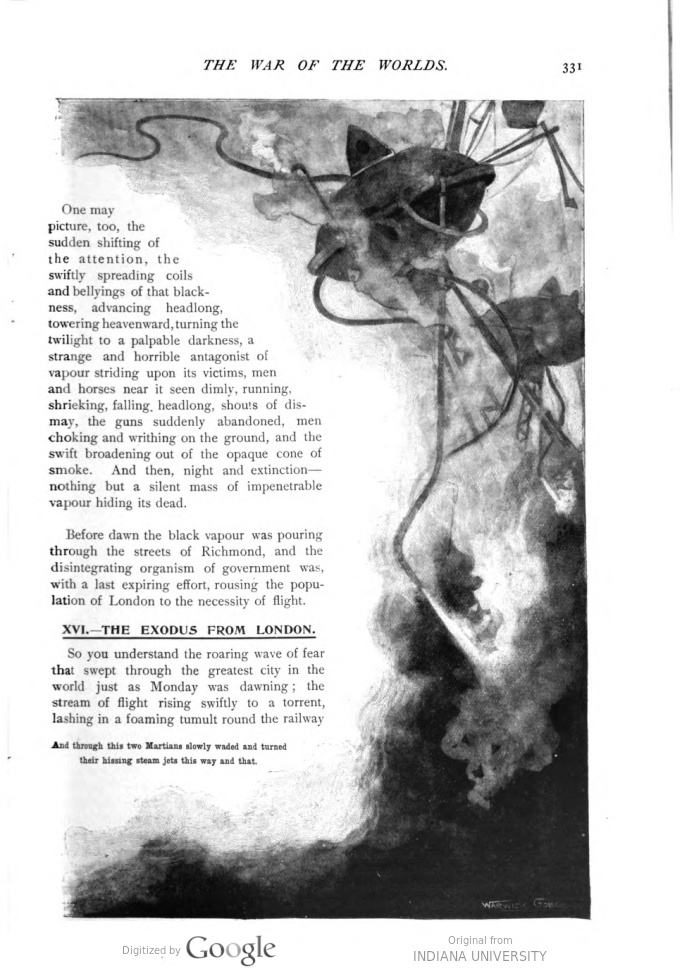
[text marker: start page 331] One may picture, too, the sudden shifting of the attention, the swiftly spreading coils and bellyings of that blackness, advancing headlong, towering heavenward, turning the twilight to a palpable darkness, a strange and horrible antagonist of vapour striding upon its victims, men and horses near it seen dimly, running, shrieking, falling headlong, shouts of dismay, the guns suddenly abandoned, men choking and writhing on the ground, and the swift broadening out of the opaque cone of smoke. And then, night and extinction—nothing but a silent mass of impenetrable vapour hiding its dead.
Before dawn the black vapour was pouring through the streets of Richmond, and the disintegrating organism of government was, with a last expiring effort, rousing the population of London to the necessity of flight.
XVI.―THE EXODUS FROM LONDON.
So you understand the roaring wave of fear that swept through the greatest city in the world just as Monday was dawning; the stream of flight rising swiftly to a torrent, lashing in a foaming tumult round the railway [text marker: end page 331]
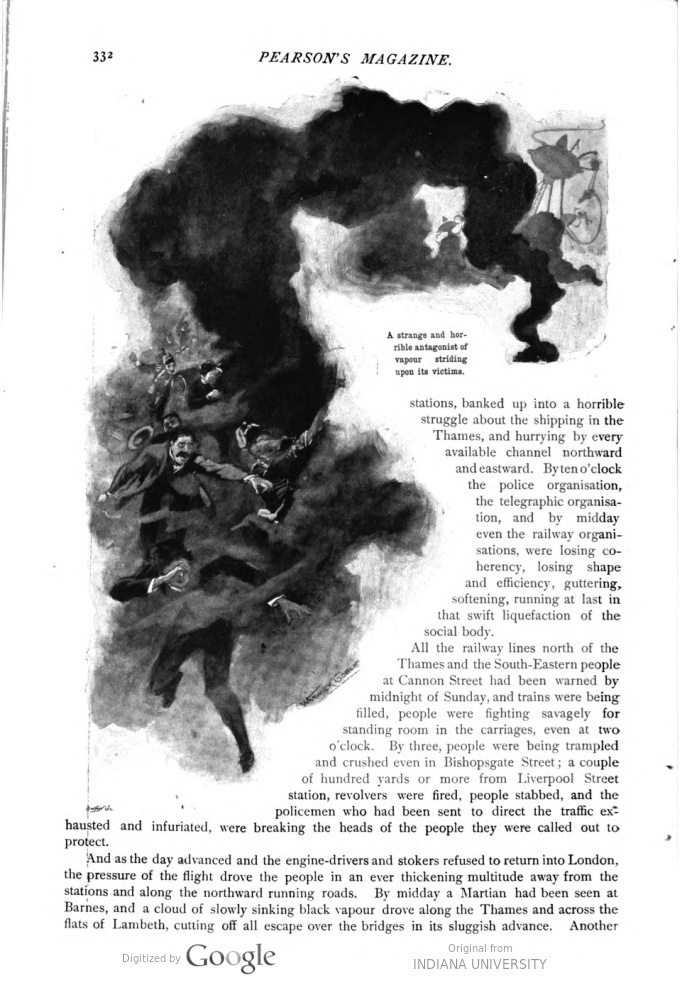
[text marker: start page 332] stations, banked up into a horrible struggle about the shipping in the Thames, and hurrying by every available channel northward and eastward. By ten o’clock the police organisation, and by midday even the railway organisations, were losing coherency, losing shape and efficiency, guttering, softening, running at last in that swift liquefaction of the social body.
All the railway lines north of the Thames and the South-Eastern people at Cannon Street had been warned by midnight on Sunday, and trains were being filled, people were fighting savagely for standing room in the carriages, even at two o’clock. By three, people were being trampled and crushed even in Bishopsgate Street; a couple of hundred yards or more from Liverpool Street station, revolvers were fired, people stabbed, and the policemen who had been sent to direct the traffic exhausted and infuriated, were breaking the heads of the people they were called out to protect.
And as the day advanced and the engine drivers and stokers refused to return into London, the pressure of the flight drove the people in an ever thickening multitude away from the stations and along the northward running roads. By midday a Martian had been seen at Barnes, and a cloud of slowly sinking black vapour drove along the Thames and across the flats of Lambeth, cutting off all escape over the bridges in its sluggish advance. Another [text marker: end page 332]
[text marker: start page 333] bank drove over Ealing, and surrounded a little island of survivors on Castle Hill, alive, but unable to escape.
My brother has described the flight of the people through Chipping Barnet very vividly. And the account of his Monday morning may serve to give an idea how it was with the individuals in that pouring multitude. He himself was no longer alone when he came to Chipping Barnet. After a fruitless struggle to get aboard a North-Western train at Chalk Farm—the engines of the trains that had loaded in the goods yard there, ploughed through shrieking people, and a dozen stalwart men fought to keep the crowd from crushing the driver against his furnace—my brother emerged upon the Chalk Farm road, dodged across through a hurrying swarm of vehicles, and had the luck to be foremost in the sack of a cycle shop. The front tyre of the machine he got was punctured in dragging it through the window, but he got up and off notwithstanding, with no further injury than a cut wrist. The steep foot of Haverstock Hill was impassable owing to several overturned horses, and my brother struck into Belsize Road.
So he got out of the fury of the panic, and, skirting the Edgware Road, reached Edgware about seven, fasting and wearied but well ahead of the crowd. A mile from Edgware the rim of the bicycle broke, and the machine became unrideable. He trudged into the village. There were shops half opened in the main street of the place, and people in the doorways and windows staring astonished at this extraordinary procession of fugitives that was beginning. At Edgware the roads were crowded, but as yet far from congested. Most of the fugitives at that hour were mounted on cycles, but there were also motor cars, hansom cabs, and carriages hurrying along, and the dust hung in heavy clouds along the road to Saint Albans. It was perhaps a vague idea of making his way to Chelmsford, where some friends of his lived, that made my brother strike into a quiet lane running eastward. The torrent of people flowed on past him. For a few minutes he thought he had the lane to himself. and then he came upon two ladies, just in time to save them.
He heard their screams, and hurrying round the corner saw a couple of men struggling to drag them out of the little pony chaise in which they had been driving, while a third with difficulty held the frightened pony’s head. One of the ladies, a short woman dressed in white, was simply screaming, the other, a dark slender figure, slashed at the man who gripped her arm with a whip she held in her disengaged hand. My brother immediately grasped the situation, shouted and hurried towards the struggle. One of the men desisted and turned towards him, and my brother, realising from his antagonist’s face that a fight was unavoidable, went into him forthwith and sent him down against the wheel of the chaise.
It was no time for pugilistic chivalry, and my brother laid him quiet with a kick, and gripped the collar of the man who pulled at the slender lady’s arm. He heard the clatter of hoofs, the whip stung across his face, a third antagonist struck him between the eyes, and the man he held wrenched himself free and made off down the lane in the direction from which he had come.
Partly stunned, he found himself facing the man who had held the horse’s head, and became aware of the chaise receding from him down the lane, swaying from side to side and with the women in it looking back. The man before him, a burly rough, tried to close, and he stopped him with a blow in the face. Then realising that he was deserted, he dodged round and made off down the lane after the chaise, with the sturdy man close behind him, and the fugitive who had turned now, following remotely.
Suddenly he stumbled and fell, his immediate pursuer went headlong, and he rose to his feet to find himself with a couple of antagonists again. He would have had little chance against them had not the slender lady very pluckily pulled up and returned to his help. It seems she had had a revolver all this time, but it had been under the seat when she and her companions were attacked. She fired at six yards distance, narrowly missing my brother. The less courageous of the robbers made off, and his companion followed him cursing his cowardice. They both stopped in sight down the lane where the third man lay insensible. [text marker: end page 333]
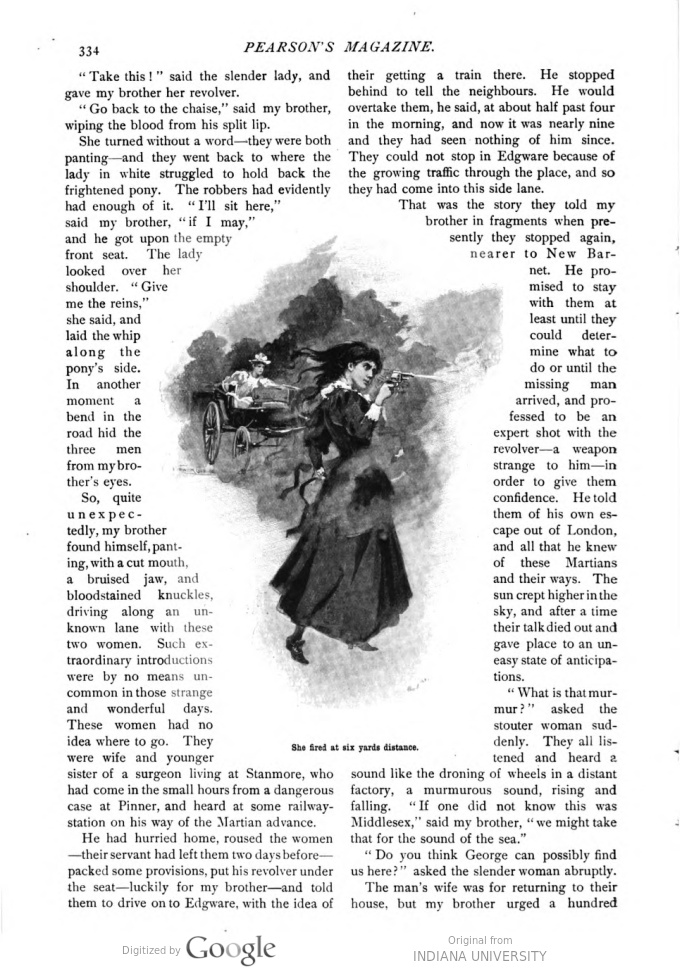
[text marker: end page 334] “Take this!” said the slender lady, and gave my brother her revolver.
“Go back to the chaise,” said my brother, wiping the blood from his split lip.
She turned without a word—they were both panting—and they went back to where the lady in white struggled to hold back the frightened pony. The robbers had evidently had enough of it. “I’ll sit here,” said my brother, “if I may,” and he got upon the empty front seat. The lady looked over her shoulder. “Give me the reins,” she said, and laid the whip along the pony’s side. In another moment a bend in the road hid the three men from my brother’s eyes.
So, quite unexpectedly, my brother found himself, panting, with a cut mouth, a bruised jaw, and bloodstained knuckles, driving along an unknown lane with these two women. Such extraordinary introductions were by no means uncommon in those strange and wonderful days. These women had no idea where to go. They were wife and younger sister of a surgeon living at Stanmore, who had come in the small hours from a dangerous case at Pinner, and heard at some railway-station on his way of the Martian advance.
He had hurried home, roused the women—their servant had left them two days before—packed some provisions, put his revolver under the seat—luckily for my brother—and told them to drive on to Edgware, with the idea of their getting a train there. He stopped behind to tell the neighbours. He would overtake them, he said, at about half past four in the morning, and now it was nearly nine and they had seen nothing of him since. They could not stop in Edgware because of the growing traffic through the place, and so they had come into this side lane.
That was the story they told my brother in fragments when presently they stopped again, nearer to New Barnet. He promised to stay with them at least until they could determine what to do or until the missing man arrived, and professed to be an expert shot with the revolver—a weapon strange to him—in order to give them confidence. He told them of his own escape out of London, and all that he knew of these Martians and their ways. The sun crept higher in the sky, and after a time their talk died out and gave place to an uneasy state of anticipation.
“What is that murmur?” asked the stouter woman suddenly. They all listened and heard a sound like the droning of wheels in a distant factory, a murmurous sound, rising and falling. “If one did not know this was Middlesex,” said my brother, “we might take that for the sound of the sea.”
“Do you think George can possibly find us here?” asked the slender woman abruptly.
The man’s wife was for returning to their house, but my brother urged a hundred [text marker: end page 334]
[text marker: start page 335] cogent reasons against that suicide. “We have money,” said the slender woman, and hesitated. Her eyes met my brother’s, and her hesitation ended. “So have I,” said my brother. She explained that they had as much as thirty pounds in gold besides a five pound note, and suggested that with that, they might get upon a train at Saint Albans or New Barnet. My brother thought that was hopeless, seeing the fury of the Londoners to crowd upon the trains, and broached his own idea of striking across Essex towards Harwich. Mrs. Elphinstone—that was the name of the woman in white—would listen to no reasoning, and kept calling upon “George,” but her sister-in-law was astonishingly quiet and deliberate; and at last agreed to my brother’s suggestion. So they went on towards Barnet, my brother leading the pony to save it as much as possible.
As the sun crept up the sky, the day became excessively hot, and under foot a thick whitish sand grew burning and blinding, so that they travelled only very slowly. The hedges were grey with dust. And slowly as they advanced towards Barnet, a tumultuous murmuring grew stronger.
“That sound,” said Miss Elphinstone presently, “is growing. It sounds now like the noise of a waterfall in the distance.”
“Or the deep note one hears from a fire,” said my brother. “It is the voice of a multitude of people. And very soon now we shall come upon the great North Road.”
As they went up a little hill towards the cross roads they saw a woman approaching the road across some fields on their left, carrying a child, and with two other children, and then a man in dirty black, with a thick stick in one hand and a small portmanteau in the other passed them. Mrs. Elphinstone suddenly cried out at a number of tongues of smoky red flame leaping up above the houses against the hot blue sky. Then round the corner of the lane, from between the villas that guarded it at its confluence with the high road, came a little cart drawn by a sweating black pony and driven by a sallow youth in a bowler hat, grey with dust. There were three girls like East End factory girls, and a couple of little children, crowded in the cart.
“This’ll tike us rahnd Edgware?” asked the driver, and when my brother told him it would if he turned to the left, he looked over his shoulder and remarked, “told yer so,” to his following.
My brother noticed a pale grey smoke or haze rising among the houses in front of them, and veiling the white façade of a terrace beyond the road that appeared between the backs of the villas. Then, as the noise of the cartweels died away behind the man, the tumultuous noise before them asserted itself again, but stronger now and clearer, the disorderly mingling of many voices, the gride of many wheels, the creaking of waggons, and in another minute the cross roads were visible. The lane came round abruptly not fifty yards from the turning. “Good heavens!” cried Mrs. Elphinstone. “What is this you are driving us into?” My brother stopped. Then, fascinated by what he saw, led the pony into the very throat of the lane, and stood amazed.
For the main road was a boiling stream of people, a torrent of human beings rushing northward, one pressing on another. A great bank of dust, white and luminous in the blaze of the sun, made everything within twenty feet of the ground grey and indistinct, and was perpetually renewed by the hurrying feet of a dense crowd of horses and of men and women on foot, and by the wheels of vehicles of every description. “Way!” my brother heard voices crying. “Make way!” It was like riding into the smoke of a fire to approach the meeting point of the lane and road: the crowd roared like a fire, and the dust was hot and pungent. And, indeed, a little way up the road a villa was burning, and sending rolling masses of black smoke across the road to add to the confusion.
So much as they could see of the road Londonward between the houses to the right, was a tumultuous stream of dirty, hurrying people pent in between the villas on either side; the black heads, the crowded forms, grew into distinctness as they rushed towards the corner, hurried past and merged their individuality again in a receding multitude that was swallowed up at last in a cloud of dust. “Go on! Go on!” cried the voices. “Way! Way!” One man’s hands pressed on the back of another. [text marker: end page 335]
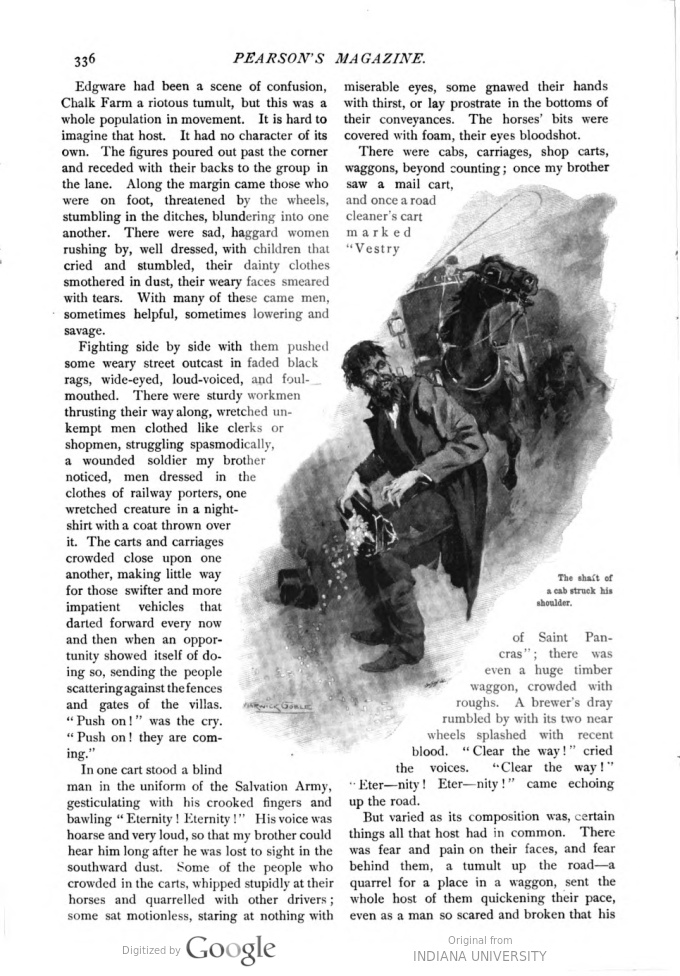
[text marker: start page 336] Edgware had been a scene of confusion, Chalk Farm a riotous tumult, but this was a whole population in movement. It is hard to imagine that host. It had no character of its own. The figures poured out past the corner and receded with their backs to the group in the lane. Along the margin came those who were on foot, threatened by the wheels, stumbling in the ditches, blundering into one another. There were sad, haggard women rushing by, well dressed, with children that cried and stumbled, their dainty clothes smothered in dust, their weary faces smeared with tears. With many of those came men, sometimes helpful, sometimes lowering and savage.
Fighting side by side with them pushed some weary street outcast in faded black rags, wide-eyed, loud-voiced, and foul-mouthed. There were sturdy workmen thrusting their way along, wretched unkempt men clothed like clerks or shopmen, struggling spasmodically, a wounded soldier my brother noticed, men dressed in the clothes of railway porters, one wretched creature in a nightshirt with a coat thrown over it. The carts and carriages crowded close upon one another, making little way for those swifter and more impatient vehicles that darted forward every now and then when an opportunity showed itself of doing so, sending the people scattering against the fences and gates of the villas. “Push on!” was the cry. “Push on! they are coming.”
In one cart stood a blind man in the uniform of the Salvation Army, gesticulating with his crooked fingers and bawling “Eternity! Eternity!” His voice was hoarse and very loud, so that my brother could hear him long after he was lost to sight in the southward dust. Some of the people who crowded in the carts, whipped stupidly at their horses and quarrelled with other drivers; some sat motionless, staring at nothing with miserable eyes, some gnawed their hands with thirst, or lay prostrate in the bottoms of their conveyances. The horses’ bits were covered with foam, their eyes bloodshot.
There were cabs, carriages, shop carts, waggons, beyond counting; once my brother saw a mail cart, and once a road cleaner’s cart marked “Vestry of Saint Pancras”; there was even a huge timber waggon, crowded with roughs. A brewer’s dray rumbled by with its two near wheels splashed with recent blood. “Clear the way!” cried the voices. “Clear the way!” “Eter-nity! Eter-nity!” came echoing up the road.
But varied as its composition was, certain things all that host had in common. There were fear and pain on their faces, and fear behind them, a tumult up the road—a quarrel for a place in a waggon, sent the whole host of them quickening their pace, even as a man so scared and broken that his [text marker: end page 336]
[text marker: start page 337] knees bent under him was galvanised for a moment into renewed activity. The heat and dust had already been at work on this multitude. Their skins were dry, their lips black and cracked. They were all thirsty, weary and footsore. And amid the various cries one heard disputes, reproaches, groans of weariness and fatigue—the voices of most of them were hoarse and weak—through it all ran a refrain: “Way! Way! The Martians are coming.”
Few stopped and came aside from that flow of men. The lane opened slantingly into the main road with a narrow opening, and had a delusive appearance of coming from the direction of London. Yet a kind of eddy of people drove into its mouth; weaklings elbowed out of the stream, who for the most part rested but a moment before plunging into it again. A little way down the lane with two friends bending over him lay a man with a bare leg, wrapped about with bloody rags. He was a lucky man to have friends.
A little old man with a grey military moustache, and a filthy black frock coat, limped out and sat down beside the trap, removed his boot—his sock was bloodstained—shook out a pebble and hobbled on again; and then a little girl of eight or nine, all alone, threw herself under the hedge close by my brother—weeping. “I can’t go on. I can’t go on.”
My brother woke from his torpor of astonishment and lifted her up, speaking gently to her, and carried her to Miss Elphinstone. So soon as my brother touched her she became quite still, as if frightened. “What does it all mean?” whispered Miss Elphinstone. “I don’t know,” said my brother. “But this poor child is dropping with fear and fatigue.” “Ellen, Ellen!” shrieked a woman in the crowd, with tears in her voice, and the child suddenly dashed away from my brother, crying: “Mother!”
“They are coming,” said a man on horseback riding past along the lane.
“Out of the way there!” bawled a coachman towering high, and my brother saw he was turning his carriage, a closed carriage such as doctors use, into the lane. The people crushed back on one another to avoid his horse. My brother pushed the pony and chaise back into the hedge, and he drove by and stopped at the turn of the way. It was a carriage for a pair of horses, but only one was in the shafts. From the chaise they saw dimly through the dust that two men were lifting out a man on a white stretcher, and putting him gently on the grass beneath the privet hedge. One of the men came running to my brother. “Where is there water?” he said. “He is dying fast and very thirsty. It is Lord Garrick.”—“Lord Garrick!” said my brother, “the Chief Justice?”—“The water?” he said.—“There may be a tap,” said my brother, “in some of the houses. We have no water. I dare not leave my people.” The man pushed his way against the crowd towards the gate of the corner house. “Go on!” said the people thrusting at him. “They are coming. Go on!”
Then my brother’s attention was distracted by a bearded eagle-faced man lugging a small handbag which split even as my brother’s eyes rested on it and disgorged a mass of sovereigns that seemed to break up into separate coins as it struck the ground.
They rolled hither and thither among the struggling feet of men and horses. The Jew stopped and looked stupidly at the heap, and the shaft of a cab struck his shoulder and sent him reeling. He gave a shriek and dodged back, and a cartwheel shaved him narrowly. “Way!” cried the men all about him. “Make way!” So soon as the cab had passed, he flung himself, with both hands open, upon the heap of coins, and began clutching handfuls in his pocket; a horse rose close upon him, and in another moment he had half risen and had been borne down under the horse’s hoofs. “Stop!” screamed my brother, and, pushing a woman out of his way, tried to clutch the bit of the horse.
Before he could get to it, he heard a scream under the wheels and saw through the dust, the tire passing over the poor wretch’s back. The driver of the cart slashed his whip at my brother, who ran round behind the cart. The multitudinous shouting dimmed and confused his ears. The man was writhing in the dust among his scattered money, unable to rise, for the wheel had [text marker: end page 337]
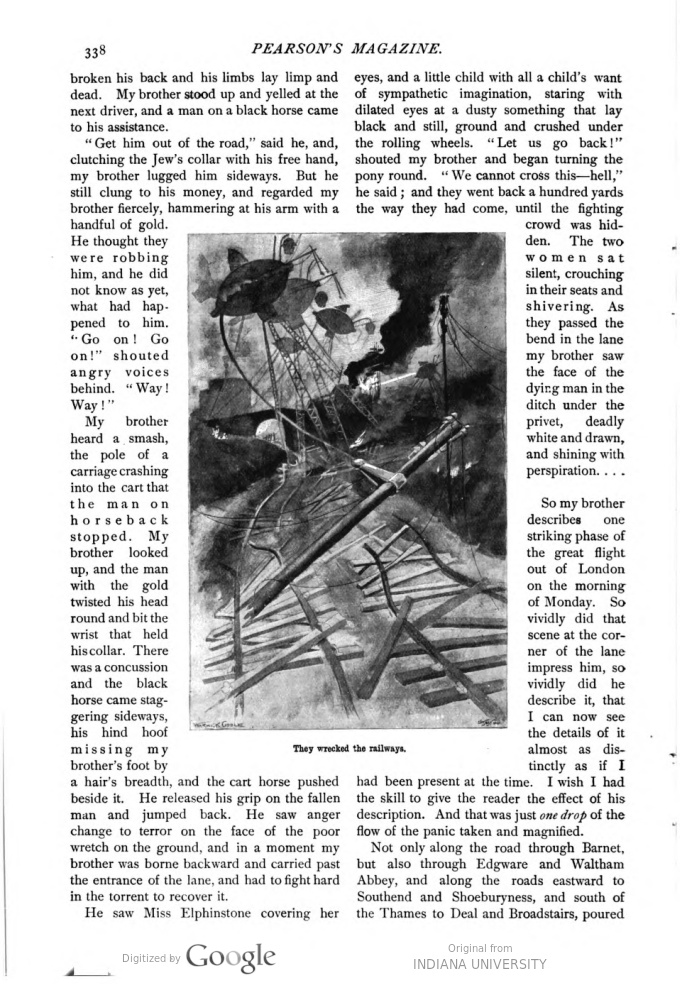
[text marker: start page 338] broken his back and his limbs lay limp and dead. My brother stood up and yelled at the next driver, and a man on a black horse came to his assistance.
“Get him out of the road,” said he, and, clutching the Jew’s collar with his free hand, my brother lugged him sideways. But he still clung to his money, and regarded my brother fiercely, hammering at his arm with a handful of gold. He thought they were robbing him, and he did not know as yet, what had happened to him. “Go on! Go on!” shouted angry voices behind. “Way! Way!”
My brother heard a smash, the pole of a carriage crashing into the cart that the man on horseback stopped. My brother looked up, and the man with the gold twisted his head round and bit the wrist that held his collar. There was a concussion and the black horse came staggering sideways, his hind hoof missing my brother’s foot by a hair’s breadth, and the cart horse pushed beside it. He released his grip on the fallen man and jumped back. He saw anger change to terror on the face of the poor wretch on the ground, and in a moment my brother was borne backward and carried past the entrance of the lane, and had to fight hard in the torrent to recover it.
He saw Miss Elphinstone covering her eyes, and a little child with all a child’s want of sympathetic imagination, staring with dilated eyes at a dusty something that lay black and still, ground and crushed under the rolling wheels. “Let us go back!” shouted my brother and began turning the pony round. “We cannot cross this—hell,” he said; and they went back a hundred yards the way they had come, until the fighting crowd was hidden. The two women sat silent, crouching in their seats and shivering. As they passed the bend in the lane my brother saw the face of the dying man in the ditch under the privet, deadly white and drawn, and shining with perspiration. . . .
So my brother describes one striking phase of the great flight out of London on the morning of Monday. So vividly did that scene at the corner of the lane impress him, so vividly did he describe it, that I can now see the details of it almost as distinctly as if I had been present at the time. I wish I had the skill to give the reader the effect of his description. And that was just one drop of the flow of the panic taken and magnified.
Not only along the road through Barnet, but also through Edgware and Waltham Abbey, and along the roads eastward to Southend and Shoeburyness, and south of the Thames to Deal and Broadstairs, poured [text marker: end page 338]
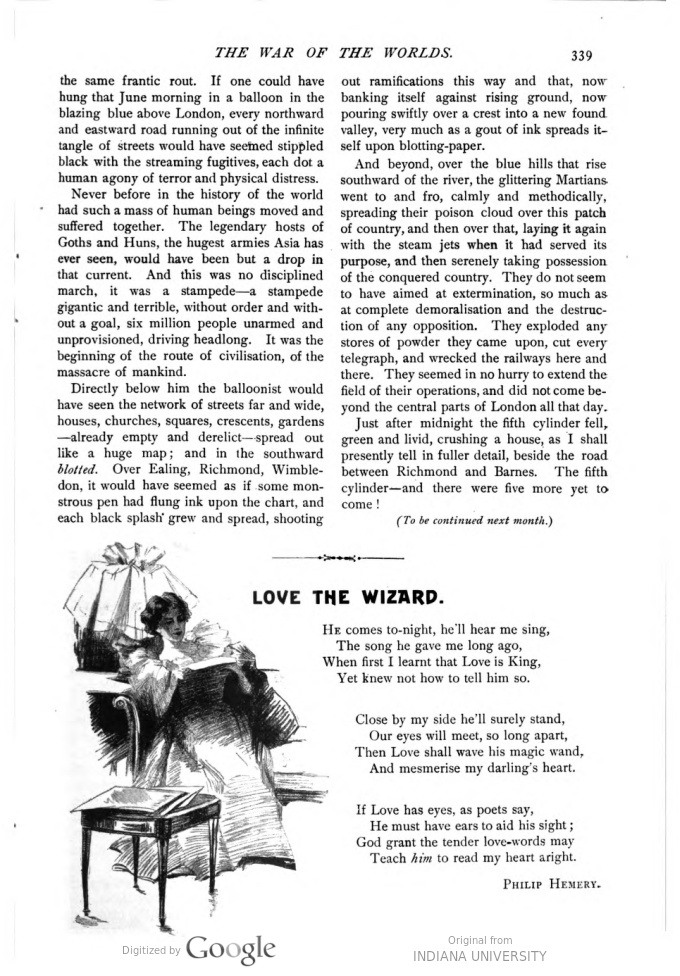
[text marker: start page 339] the same frantic rout. If one could have hung that June morning in a balloon in the blazing blue above London every northward and eastward road running out of the infinite tangle of streets would have seemed stippled black with the streaming fugitives, each dot a human agony of terror and physical distress.
Never before in the history of the world had such a mass of human beings moved and suffered together. The legendary hosts of Goths and Huns, the hugest armies Asia has ever seen, would have been but a drop in that current. And this was no disciplined march, it was a stampede—a stampede gigantic and terrible, without order and without a goal, six million people unarmed and unprovisioned, driving headlong. It was the beginning of the rout of civilisation, of the massacre of mankind.
Directly below him the balloonist would have seen the network of streets far and wide, houses, churches, squares, crescents, gardens—already empty and derelict—spread out like a huge map; and in the southward blotted. Over Ealing, Richmond, Wimbledon, it would have seemed as if some monstrous pen had flung ink upon the chart, and each black splash grew and spread, shooting out ramifications this way and that, now banking itself against rising ground, now pouring swiftly over a crest into a new found valley, very much as a gout of ink would spread itself upon blotting-paper.
And beyond, over the blue hills that rise southward of the river, the glittering Martians went to and fro, calmly and methodically, spreading their poison cloud over this patch of country, and then over that, laying it again with their steam jets when it had served its purpose, and then serenely taking possession of the conquered country. They do not seem to have aimed at extermination, so much as at complete demoralisation and the destruction of any opposition. They exploded any stores of powder they came upon, cut every telegraph, and wrecked the railways here and there. They seemed in no hurry to extend the field of their operations, and did not come beyond the central part of London all that day.
Just after midnight the fifth cylinder fell, green and livid, crushing a house, as I shall presently tell in fuller detail, beside the road between Richmond and Barnes. The fifth cylinder—and there were five more yet to come!
(To be continued next month.)
[text marker: end page 339, end installment 6]
previous installment | next installment
The following is the text of a poem that appears in the bottom half of page 339. It was common practice for Victorian periodicals to fill parts of pages with poetry or other short pieces that are unrelated to the other text on a given page.
LOVE THE WIZARD.
He comes to-night, he’ll hear me sing,
The song he gave me long ago,
When first I learnt that Love is King,
Yet knew not how to tell him so.
Close by my side he’ll surely stand,
Our eyes will meet, so long apart,
Then Love shall wave his magic wand,
And mesmerise my darling’s heart.
If Love has eyes, as poets say,
He must have ears to aid his sight;
God grant the tender love-words may
Teach him to read my heart aright.
PHILIP HEMERY.

